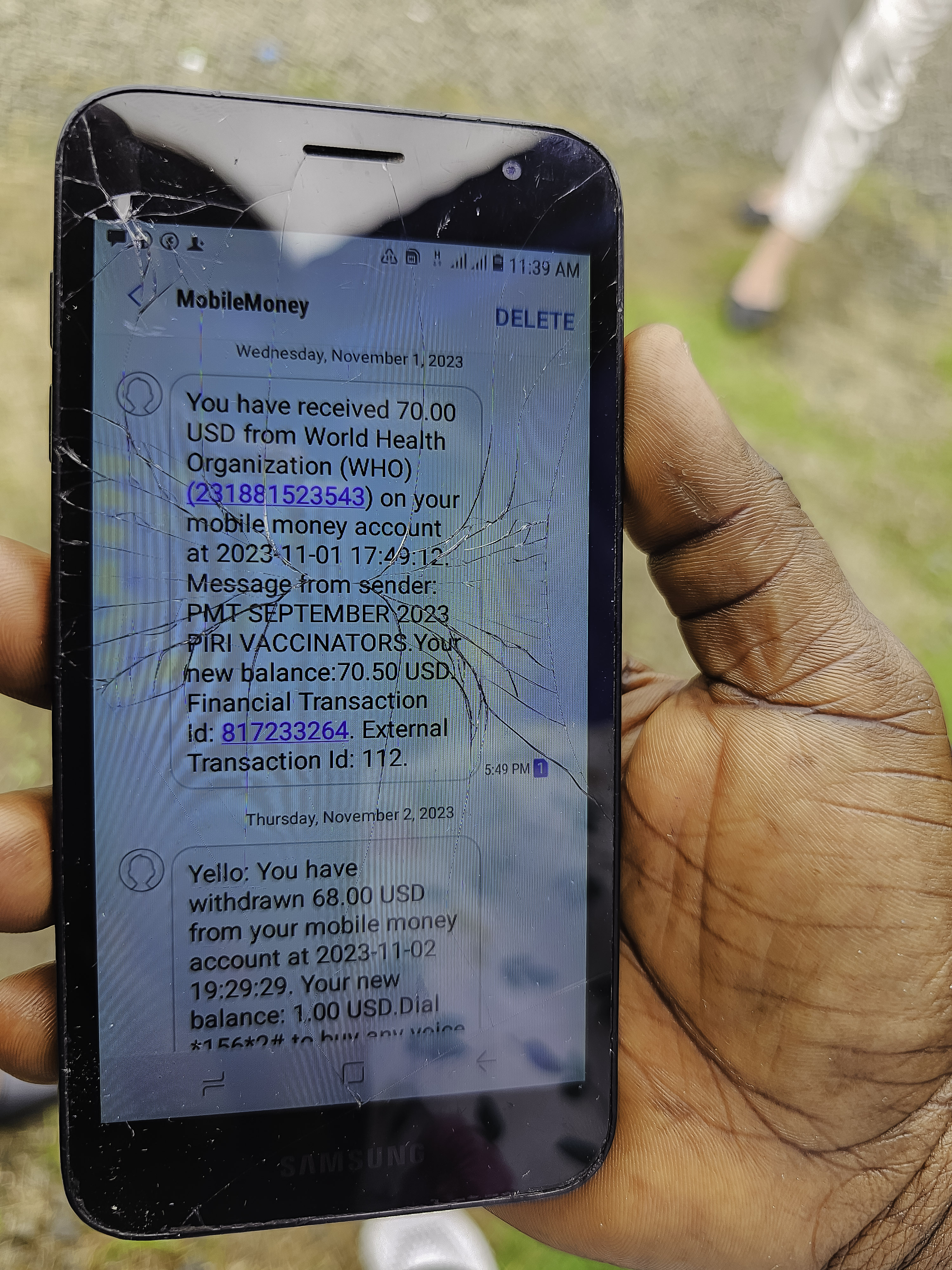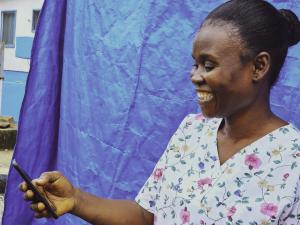Liberia demonstrates Value for Money (VfM) in programme implementation through a higher value-driven solution for effective cash distribution.
Introduction
 In 2020, Liberia reported an outbreak of circulating vaccine-derived polio virus type 2 (cVDPV2) which posed a formidable challenge to Liberia's healthcare system, necessitating a swift and effective response. In response to the cVDPV2 outbreak, the Ministry of Health in collaboration with WHO, UNICEF, and other partners conducted vaccination campaigns using the Novel Oral Polio vaccine type 2 (nOPV2). This undertaking hinged on the dedication and expertise of hundreds of vaccinators across the country.
In 2020, Liberia reported an outbreak of circulating vaccine-derived polio virus type 2 (cVDPV2) which posed a formidable challenge to Liberia's healthcare system, necessitating a swift and effective response. In response to the cVDPV2 outbreak, the Ministry of Health in collaboration with WHO, UNICEF, and other partners conducted vaccination campaigns using the Novel Oral Polio vaccine type 2 (nOPV2). This undertaking hinged on the dedication and expertise of hundreds of vaccinators across the country.
Timely payment of allowances to these frontline workers was crucial for maintaining their morale and motivation during campaigns. However, traditional methods of allowance distribution, such as cash payments from the national level to the communities in various counties, were plagued with inefficiencies and lengthy bureaucratic challenges that included delays in disbursement, high transaction costs, and security risks associated with handling large amounts of cash.
Addressing the Challenges: Embracing Mobile Money Transfers
To address these challenges, WHO recommended an innovative initiative to the Ministry of Health to use the mobile money transfer system for processing allowances for vaccinators. This innovative approach harnessed the widespread adoption of mobile money services operational in Liberia to streamline the payment process and ensure that allowances were delivered directly into the hands of vaccinators. This payment approach, initially used by WHO and other UN agencies collaborating with the Ministry of Health, is now being applied for the implementation of various activities beyond the Ministry of Health including by other non-UN agencies.
Impact: Value for Money
The adoption of mobile money transfers that has ensured real time payments of allowances for participants in WHO supported activities has had a transformative impact on the lives of Liberian vaccinators and other health workers that demonstrates a strong value for money.
Efficiency
By eliminating the need for physical cash handling, the system has significantly reduced the time required to process payments, ensuring that vaccinators receive their allowances promptly. This timely access to funds has boosted their morale and motivation, enabling them to continue their crucial work of protecting the Liberian population from vaccine-preventable diseases.
Ethics
Additionally, the mobile money transfer system has enhanced transparency and accountability in the allowance payment process. Each transaction is recorded electronically, providing a clear audit trail that minimizes the risk of fraud or misappropriation of funds.
Equity
This has instilled greater confidence among vaccinators that their allowances are being managed fairly, efficiently and are confident of receiving their allowances completely devoid of deductions or inaccuracies in the process.
Economy
The mobile money approach has also proven to be economical as the digitalized payments for services provided have been a game changer in facilitating the achievement of results. The transaction fees used to process funds to the end user are a way less an expense, as opposed to manual cash disbursement which entailed other logistical expenses for the staff members engaged in the disbursement of the funds.
"Before the mobile money transfer system, we had to wait for weeks or even months to receive our allowances. It was often a long and frustrating process. But now, with mobile money, we get our allowances in the shortest time, and it's so easy to access. This has made a big difference in timely receipt of incentives", narrated Nyanjikua Foday- Vaccinator at Dupo Road Health centre in Montserrado.
Effectiveness (Sustainability)
The success of this initiative has extended beyond polio and COVID-19 vaccination efforts. Recognizing the effectiveness of mobile money transfers, WHO and other sister UN agencies are applying the same principles of mobile money transfers for activities implemented by other programs in the Ministry of Health. This demonstrates the versatility and scalability of the mobile money transfer system, maximizing VfM across various initiatives including healthcare.
"The implementation of the mobile money payment system has brought about a significant transformation in the way large-scale payments are made, guaranteeing timely, efficient, secure, and transparent payment methods. Our ministry personnel are now able to dedicate their attention to other responsibilities, unlike in the past when they had to handle cash transactions. This approach has also created more time for the Ministry staff to effectively focus on program delivery", - Mr. Adolphus Clark, EPI Manager, Ministry of Health
Conclusion: A Model for Sustainable Healthcare Resource Distribution
The implementation of mobile money transfers for processing allowances for vaccinators and participants in other WHO supported activities in Liberia stands as a testament to the power of technology to address complex challenges in the healthcare sector. By streamlining the payment process, enhancing transparency, efficiency, accountability, and eliminating risks associated with handling large amounts of cash.
“Leveraging on mobile money for payment of mass vaccination workers isn't just a technological upgrade; it's a strategic move towards transparency, efficiency, and financial inclusion. Embracing mobile payments empowers our teams, enhances accountability, and ensures that our focus remains steadfast on delivering successful vaccination campaigns."- WHO EPI Officer- Dr. Abdullahi Suleiman
This innovative approach has played a significant role in supporting Liberia's public health responses during the polio outbreak, the COVID-19 pandemic, and the implementation of the GPW-13 workplans. Additionally, it has been used to disburse funds to frontline workers supporting the integration of COVID-19 vaccines into routine immunization. Moreover, its successful application across a wider range of healthcare programs highlights its potential as a sustainable payment model for frontline workers in the field. The experience provides valuable insights for others seeking to optimize service delivery (their fund disbursement and ensuring their frontline workers get their allowances timely), ultimately contributing to stronger and more resilient healthcare systems.
